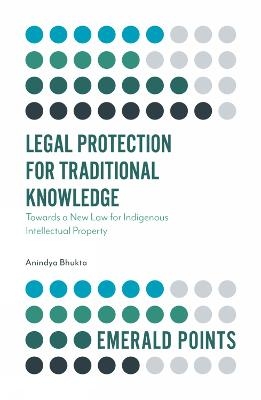
Legal Protection for Traditional Knowledge
Towards a New Law for Indigenous Intellectual Property
Seiten
2020
Emerald Publishing Limited (Verlag)
978-1-80043-066-2 (ISBN)
Emerald Publishing Limited (Verlag)
978-1-80043-066-2 (ISBN)
Legal Protection for Traditional Knowledge calls attention to the vital contributions that
aboriginal knowledge makes to global development and how the legal systems in
place, particularly in India, must change to protect this knowledge.This book is a must-read for researchers in
economics, development studies, and international law.
Many aboriginal communities in the Global South depend for their livelihoods on the vast supply of bio-resources around them, but multinational corporations (MNCs) are not always ethical in their dealings with these communities. MNCs often pirate and patent communal, traditional knowledge, thereby "acquiring" intellectual property potentially worth hundreds of millions of dollars almost free of cost. Aboriginal communities face steep uphill legal battles in these cases.
Here Anindya Bhukta explores the porous legal relations between traditional knowledge and current intellectual property law. Focusing on aboriginal communities in India, Bhukta explains how India, like other resource-rich countries, has spent millions trying to revoke US-issued patents on knowledge gained from aboriginal communities using existing IPR legislation. He demonstrates that existing IPR laws do not provide full legal protection in such cases - a fact acknowledged by the World Trade Organization when it categorically asked for a sui generis law to be developed for precisely these purposes - and he suggests just such a new law that could offer more robust legal protection for aboriginal communities wishing to capitalize on their own accomplishments. In so doing, Bhukta calls attention to the vital contributions that aboriginal communities make to global development.
Legal Protection for Traditional Knowledgeis a must-read for researchers in economics, development studies, and international law, and especially those with an interest in the intellectual property status of traditional knowledge.
aboriginal knowledge makes to global development and how the legal systems in
place, particularly in India, must change to protect this knowledge.This book is a must-read for researchers in
economics, development studies, and international law.
Many aboriginal communities in the Global South depend for their livelihoods on the vast supply of bio-resources around them, but multinational corporations (MNCs) are not always ethical in their dealings with these communities. MNCs often pirate and patent communal, traditional knowledge, thereby "acquiring" intellectual property potentially worth hundreds of millions of dollars almost free of cost. Aboriginal communities face steep uphill legal battles in these cases.
Here Anindya Bhukta explores the porous legal relations between traditional knowledge and current intellectual property law. Focusing on aboriginal communities in India, Bhukta explains how India, like other resource-rich countries, has spent millions trying to revoke US-issued patents on knowledge gained from aboriginal communities using existing IPR legislation. He demonstrates that existing IPR laws do not provide full legal protection in such cases - a fact acknowledged by the World Trade Organization when it categorically asked for a sui generis law to be developed for precisely these purposes - and he suggests just such a new law that could offer more robust legal protection for aboriginal communities wishing to capitalize on their own accomplishments. In so doing, Bhukta calls attention to the vital contributions that aboriginal communities make to global development.
Legal Protection for Traditional Knowledgeis a must-read for researchers in economics, development studies, and international law, and especially those with an interest in the intellectual property status of traditional knowledge.
Anindya Bhukta is an Associate Professor of Economics at Burdwan University, India. He has worked on intellectual property rights issues for over two decades, is editor of the online journal Economy, Polity, Environment, and is the first author to write Bengali dictionaries of economics and the environment.
Chapter 1. Introduction
Chapter 2. Traditional Knowledge: An Overview
Chapter 3. Bio-Piracy
Chapter 4. Protecting Traditional Knowledge: Ways and Means
Chapter 5. Initiatives to Protect Traditional Knowledge
Chapter 6. How Fit are the Existing IPR Laws in Protecting Traditional Knowledge?
Chapter 7. A Model Law
| Erscheinungsdatum | 12.06.2020 |
|---|---|
| Reihe/Serie | Emerald Points |
| Verlagsort | Bingley |
| Sprache | englisch |
| Maße | 129 x 198 mm |
| Gewicht | 210 g |
| Themenwelt | Naturwissenschaften ► Geowissenschaften |
| Recht / Steuern ► EU / Internationales Recht | |
| Recht / Steuern ► Wirtschaftsrecht ► Urheberrecht | |
| Sozialwissenschaften ► Ethnologie | |
| Sozialwissenschaften ► Soziologie | |
| ISBN-10 | 1-80043-066-3 / 1800430663 |
| ISBN-13 | 978-1-80043-066-2 / 9781800430662 |
| Zustand | Neuware |
| Haben Sie eine Frage zum Produkt? |
Mehr entdecken
aus dem Bereich
aus dem Bereich
Gesetz gegen den unlauteren Wettbewerb, Preisangabenverordnung, …
Buch | Softcover (2024)
dtv Verlagsgesellschaft
CHF 23,65
Textausgabe zum deutschen, europäischen und internationalen Patent-, …
Buch | Softcover (2023)
dtv Verlagsgesellschaft
CHF 24,95


